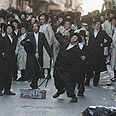
Ultra-Orthodox riots in Jerusalem
Photo: Gil Yohanan
There is a story about ultra-Orthodox leader Rabbi Yosef Haim Zonnenfeld, may he rest in peace, who was once told about a store in Jerusalem’s Old City that remained open on Shabbat. Without hesitating, the elderly rabbi grabbed a stool, made his way to the site, and upon arrival at the store sat down at the entrance and started to recite psalms. His act had the desired effect, and the store’s owner decided to close down the store on Shabbat.
Later on, rumors of that same store made their way to other Hassidim. They turned to Rabbi Zonnenfeld outraged and pled with him to engage in greater protest against the desecration of the Shabbat and of Jerusalem’s sanctity. However, to their surprise, the rabbi silenced and reprimanded them: “The fact the store owner desecrated the Shabbat is one offence. But talking about that offence when it no longer takes place is yet another offence.”
Today, we can fondly remember the days where protests were only held for purely spiritual purposes.
In media interviews, public notices posted on the streets, the ultra-Orthodox press, and even amongst themselves the Orthodox can try to convince and be convinced of many things: That they are holding their protests for the sake of the sanctity of the Shabbat, that Mayor Barkat is doing everything deliberately and therefore he must be condemned and fought, and that the seculars are wrong.
However, for some reason, the sense that emerges is that some people protest not because of the Shabbat and the peace, but rather, for the sake of the action. Or in other words, in the spirit of the story about Rabbi Zonnenfeld, and as an Orthodox Jerusalem resident said this week: “We need to protest and that’s it; without too much philosophizing and weekly discussions before and after on what we’re allowed and not allowed to do.”
Disturbing question
The ultra-Orthodox protests against the opening of a Jerusalem parking lot on Shabbat raise a disturbing question: Is anyone out there doing it for purely spiritual reasons? There is no doubt that each and every one of the Orthodox protestors is pained by the desecration of the Shabbat. Yet is anyone out there pained by the absence of peace? The term “Shabbat Shalom” cannot be broken into two. The opposite is true. “Shabbat” and “Shalom” are interdependent. Shabbat without peace is like a candle without a flame.In Jewish thinking, the essential aim of the Shabbat is peace. Peace among all worlds. We are talking about a powerful and constitutive value in Judaism. Protest is also legitimate, yet one cannot fight for the Shabbat by resorting to violence and exaggerated zeal, because there is no Shabbat without peace. It appears that the ultra-Orthodox are missing an important point here. Their intention is desirable, yet their actions are not.
I will go out on a limb here, but I am convinced that if we asked each and every one of the protestors whether they wish the entire people of Israel to keep the Shabbat, they would certainly say yes. But is that so? Do violent protests, threats, brawls involving police officers, and the burning of garbage dumpsters bring about this end result? To me it appears that the opposite is true. I am also convinced that many Orthodox are not comfortable with the image attributed to the ultra-Orthodox community through the kind assistance of some hot-headed zealots.
I have a personal request for the Orthodox protestors who intend to hit the streets this weekend: Even before you leave, while you are praying at the synagogue in the morning, when you accompany the Torah scroll back to the holy ark, please pay serious attention to the following words: “Her ways are ways of pleasantness, and all her paths are peace.”















